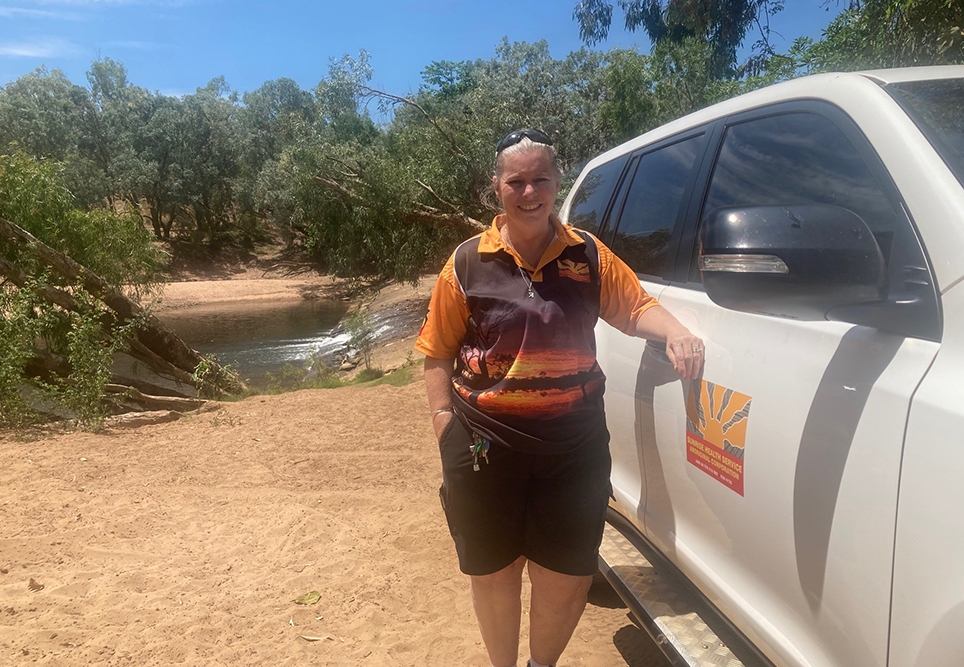This site may not work properly using older versions of Edge and Internet Explorer. You should upgrade your browser to the latest Chrome, Firefox, Edge, Safari, or any other modern browser of your choice. Click here for more information.
Your Stories
This is where we tell your stories, cover topical issues and promote meaningful initiatives.
The life and times of Credentialed Diabetes Educator, Kerri Rothery
Kerri Rothery was presented as a graduate at the 2022 CRANAplus Conference, for having completed a Master of Remote and Indigenous Health through Flinders University. We catch up with Kerri to discuss her role as a Credentialed Diabetes Educator (CDE) with Sunrise Health Service, covering her decision to become credentialed, emerging diabetes tech, bush smarts, and the privilege of working on Country.
It’s a bright morning in Bulman, one of nine communities Kerri Rothery visits in her role as a CDE.
She arrives equipped with a Point of Care Machine, haemoglobin A1C and urine albuminto-creatinine ratio tests, LibreView sensors, Blood Glucose Meter machines, booklets, leaflets, diaries, and lancets, ready to see the patients that the driver is bringing to the clinic.
It’s her role to provide information, establish self-management plans, monitor progress, and follow up with over 400 patients. “Education is about providing patients with information enabling them to make informed decisions and choices to improve their diabetic journey,” Kerri says.
“You don’t know what you don’t know… Anyone who wants to learn, whether they’re a RAN, a health centre manager, an Indigenous client, someone walking down the street – I’m just happy to sit, have a yarn with them, and see if I can empower someone’s choices in life.” Having half the knowledge is not enough, Kerri says. It’s like “working with one hand tied behind the back.”
Incomplete understanding can show when clients boycott soft drink in favour of orange juice or iced coffee, or eat excessive carbohydrates, unaware that unused carbs convert to sugar in the blood.
Therefore, helping to establish a fuller understanding is key. To gain an audience, you first need rapport. It’s also beneficial to discuss the broader benefits of the healthier lifestyle that results from a diabetes management plan.
“Managing your sugars, you’re eating better, which reduces your weight, which reduces your cholesterol, which reduces your blood pressure,” Kerri says in relation to Type 2 diabetes. “You’ve reduced your cardiovascular risk, your impact on your kidneys.”
Having as many patients as she does, variety is her every day, and Kerri must alter her education style when supporting patients of all diabetes types and ages across the lifespan – from Type 1 toddlers to Type 2 elderly.
“You have to ask yourself – have they ever had education before?” she says.
“What did they learn from that education? Do they want to know more – or are they at the clinic because they’ve been told to be here?
“If they’re children, you’re educating the family, not the child,” Kerri provides as an example. “The young ones are more likely to be Type 1s, so you generally meet adults who are frightened. They’ve got this beautiful child and suddenly he’s Type 1, which is normally found out due to a clinical event.”
Delivering the best care in a complex setting requires continuous professional development (CPD), which is one of the reasons Kerri decided to become credentialed by the Australian Diabetes Educator Association. This requires 1000 hours of practice, mentoring, and an ADEA-accredited post-graduate certificate.
Maintaining it requires 20 hours of additional CPD annually, which helps keep Kerri up to speed.
“When I started nursing years ago there was no continuous glucose monitors, no LibreView,” Kerri says.
“Insulin pumps change about every 18 months to two years… Technology is becoming an amazing thing. I’ve had to stay up to date to be able to educate appropriately in this space.”
Kerri is proud to have gone down the credentialing path and is loving the kind of remote practice it has opened to her.
“You also have to be smart,” she continues. “Having a sat phone in the car. Bringing plenty of water. Not standing under the sun when it’s 40 degrees. Taking your time, not overworking, because you won’t last.
“Being adaptable. If a patient doesn’t turn up on the day you’ve turned up, that’s okay. It’s probably not because of you. They’re got other concerns that are more pending. You have to take it in your stride.
“My role requires me to spend time in communities. The normal, everyday person doesn’t get to do that,” Kerri continues.
“The welcoming I’ve had from communities has been amazing; having the privilege to stand by and see some ceremonial practices out at community… It’s been a wonderful cultural learning experience that I will remember forever.
“Completing my Master of Remote and Indigenous Health has prepared me for this journey. However, my learning in this space has only just begun. By working with Indigenous communities my knowledge is continually expanding with wonder and I am fortunate to have this opportunity. Being out here working in the bush is my dream job.”
Read more stories from our December magazine.
